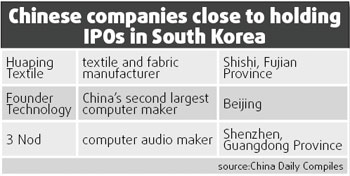Korean exchange a pull for Chinese stocks
By Wang Xu (China Daily)Updated: 2007-06-20 08:28
Chinese companies are eyeing South Korea's Stock Exchange to finance their growth, lured by the market's efforts to welcome overseas firms with open arms.
"There are now more than 10 Chinese companies preparing for share offerings in South Korea," said Park Jae Hyong, assistant manager of the equity capital market team in Seoul-based Tong Yang Investment Bank.
The bank plans to open its first office in China later this year, hoping to
capitalize on Chinese companies' growing interest in a Seoul listing. 
Earlier this month, Huafeng Textile International Group, a textile and fabric company in East China's Fujian Province, submitted a listing application to the Korea Exchange, or KRX.
Huafeng expects to raise as much as HK$234 million by selling 6 million depository receipts, which will make it the first overseas company to list in the bourse.
"The Korean stock exchange could be a good option for Chinese companies, especially the small and medium-sized ones," said Ma Lingjiang, a lawyer from Ma Lingjiang Law Firm. Ma's firm has helped a few Chinese companies prepare to list in KRX.
KRX was created in January 2005 by a merger of the Korea Stock Exchange, Korea Futures Exchange and KOSDAQ.
But the exchanges had had their sights on China since the early 2000s. In 2004, KRX established a marketing department for listing and later sent representatives to China to promote the bourse.
"Low listing cost is one of the advantages of KRX," Ma said. "It's only about half of the listing cost in Hong Kong and Singapore."
KOSDAQ, South Korea's counterpart of NASDAQ, says the listing cost in the bourse is about one-twentieth of that in NASDAQ and one-fifth of Britain's AIM.
"Moreover, mainland's manufacturing companies are likely to get higher valuation in KRX, rather than Hong Kong and Singapore," Ma said.
Manufacturing companies now account for about 60 percent of all listed firms in KRX, with an average price-earning ratio of 18.
"Such high P/E ratio is almost impossible in Hong Kong and Singapore, where investors are more enthusiastic about financial and property companies," Ma said.
According to Ma, China's second-largest computer maker Founder Technology Group and 3NOD Digital Group, a PC speaker manufacturer, have also applied to go public in South Korea.
Founder has reportedly hired South Korea's Woori Investment & Securities to help it with a Seoul listing and the company is trying to complete the share offering before the end of this year.
A source from 3NOD also confirmed the listing and the company is reportedly going to establish a joint venture in South Korea late this year.
"Chinese companies are very popular among Korean Investors these days," said Li Shangyi, general manager of ShangYi Investment Management Co Ltd, a Shanghai-based consultancy specializing in listing in Korea.
In 2006, South Korean investors bought $77.2 billion worth of stocks in overseas exchanges, among which 17 percent were spent on Chinese companies.
"The trend will continue as China's economy grows and bilateral trade develops," Li said.
South Korea has made several efforts to attract foreign companies to list on its stock market in recent years. In late 2005, the bourse decided to allow foreign companies to launch initial public offerings and to be listed on the KRX. Before that, KRX could only act as a secondary stock trading market for foreign companies.
But analysts say that for most mainland companies, South Korea could still be a difficult choice given the language barrier compared with Hong Kong and Singapore and the bourse's limited experience in dealing with overseas companies.
(For more biz stories, please visit Industry Updates)